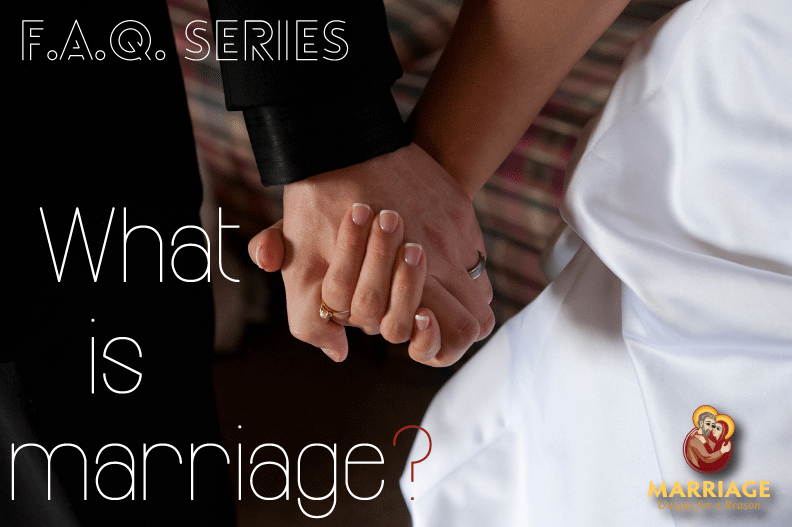For the next 5 weeks, MUR will be going over a few of the FAQs on our website. We are starting with #3: What is marriage?
Here is the Catechism definition: Marriage is the lifelong partnership of mutual and exclusive fidelity between a man and a woman, ordered to the good of the spouses and the procreation and education of children (see CCC, no. 1601; CIC, can. 1055.1; GS, no. 48).
Let’s see how much is covered by that one sentence:
- Lifelong = no divorce, ends at the death of one of the spouses
- Partnership = each spouse gives the proverbial 100% and the two persons are equal
- Mutual = shared in common
- Exclusive = excluding all others
- Fidelity = faithfulness, sexual and emotional
- Ordered to = made, designed, or constructed in such a way as to do X
- Good of the spouses = what is good for both the man and the woman– heaven
- Procreation = helping God to bring new life into the world
- Education = parents are the first educators of their children
At the heart of married love, the Church says, is the total gift of self that husband and wife freely offer to each other, becoming “one flesh” and being open through one another to children, “who are a living reflection of their love” (FC, no. 14).
In other words, when a husband and wife unite in the sexual act, it is not just some form of pleasant recreation, but rather an expression of the unity they seek to live out on an everyday basis through sharing themselves with each other.
Marriage in the Catholic Church between a baptized man and a baptized woman has also been raised to be a Sacrament by Christ.
A sacrament (lowercase s) is a sign of something greater; it points beyond itself to some other reality, and is somehow tied to that reality. For example, the body is the sacrament of the soul. You know that I exist, and that I have a soul, because you see my body and it is a human body.
A Sacrament (with a capital S), on the other hand, is one of the seven formal Sacraments of the Catholic Church which come from Christ Himself to give his people the grace they need for the journey. Each one of the Sacraments has its roots in Scripture and Tradition. Marriage is a unique Sacrament, because it was always a (lowercase “s”) sacrament from the beginning of time. The union of man and woman always pointed beyond itself to something greater: the mystery of a God who is Love. But Jesus raised this natural sacrament to a formal Sacrament at the Wedding of Cana, revealing that it is a concrete sign of his union with the Church. He showed that the relationship of man and woman to one another was also meant to be open to God and his grace.
This also partly explains why the Catholic Church is interested in the civil definition of marriage, not just Sacramental marriage. The union of a man and a woman points to God, even when it is not a Sacramental bond.

Thank-you so much. I am involved in Sacramental Preparations right now in our Parish and this adds a much clearer understanding of the meaning of s(S)acrament. The reference to Cana and Jesus “that it is a concrete sign of his union with the Church.” and being open to God’s grace,gives a whole new dimension to my understanding and appreciation of the Church as the Bride of Christ.Thank-you Thank-you